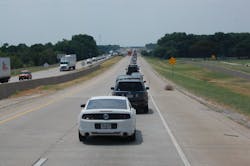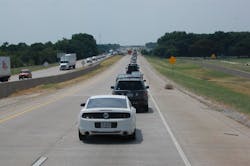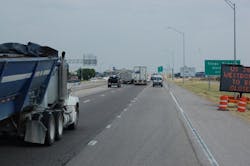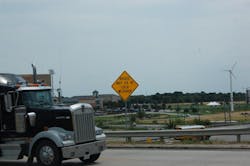Get ready: traffic congestion poised to go from bad to worse
According to TTI’s 2015 Urban Mobility Scorecard, travel delays due to traffic congestion caused drivers to waste more than 3 billion gallons of fuel last year and kept travelers stuck in their cars for nearly 7 billion extra hours or 42 hours per rush-hour commuter.
Here’s a price tag to go along with those frightful number: traffic congestion now costs the U.S. some $160 billion annually, or $960 per commuter.
Washington, D.C. tops the list of gridlock-plagued cities, with 82 hours of delay per commuter, followed by Los Angeles (80 hours), San Francisco (78 hours), New York (74 hours), and San Jose (67 hours).
TTI noted that the problem has become so bad in major urban areas that drivers have to plan more than twice as much travel time as they would need to arrive on time in light traffic just to account for the effects of irregular delays such as bad weather, collisions, and construction zones. For example, drivers on America’s Top 10 worst roads waste on average 84 hours or 3.5 days a year on average in gridlock – twice the national average. Of these roads, six are in Los Angeles, two are in New York and the remaining two are in Chicago. Nine other cities have roads ranked among the 50 worst.
INRIX added that its data also indicates that traffic congestion isn’t just a big-city issue anymore.Indeed, the company said cities of all sizes are experiencing the traffic challenges seen before the start of the “Great Recession” that started back in 2007 – increased gridlock due to growing urban populations and lower fuel prices are outpacing the nation’s ability to build infrastructure.
Of America’s Top 10 Worst Traffic cities, seven of them experienced population growth outpacing the national average of 0.7% last year, INRIX reported, including Los Angeles, San Francisco, San Jose, Seattle, Houston and Riverside, CA.
Additionally, some of the worst traffic cities also experienced some of the largest decreases in fuel prices (down some 4.1% nationally) including: Riverside, CA; Houston, TX; Los Angeles, CA; San Jose, CA; Boston and Chicago.
As a result, the average travel delay per commuter nationwide is more than twice what it was in 1982. For cities of less than 500,000 people, the problem is four times worse than in 1982, noted Tim Lomax, one of the annual report’s co-authors and a regents fellow at TTI
“Our growing traffic problem is too massive for any one entity to handle; state and local agencies can’t do it alone,” he stressed in a statement. “Businesses can give their employees more flexibility in where, when and how they work, individual workers can adjust their commuting patterns, and we can have better thinking when it comes to long-term land use planning. This problem calls for a classic ‘all-hands-on-deck’ approach.”Indeed, to add fuel to this particular fire, recent data from the U.S. Department of Transportation shows that Americans have driven more than 3 trillion miles in the last 12 months – a new record, surpassing the 2007 peak just before the global financial crisis, stressed the mobility report’s authors.
They added that the U.S. needs more roadway and transit investment to meet the demands of population growth and economic expansion, but added capacity alone can’t solve congestion problems.
Rather, solutions must involve a mix of strategies, combining new construction, better operations, and more transportation options as well as flexible work schedules, emphasized Jim Bak, another of the report’s authors and a director at INRIX.
“Connectedness, big data and automation will have an immense impact over the next decade on how we travel and how governments efficiently manage the flow of people and commerce across our transportation networks,” Bak said in a statement.
He added that this year’s mobility report predicts urban roadway congestion will continue to get worse without more assertive approaches on the project, program, and policy fronts. By 2020, with a continued good economy:
- Annual delay per commuter will grow from 42 hours to 47 hours.
- Total delay nationwide will grow from 6.9 billion hours to 8.3 billion hours.
- The total cost of congestion will jump from $160 billion to $192 billion.
UGH. That sure doesn’t sound very pleasant now does it?



